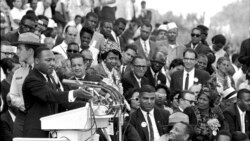On the third Monday in January, we honor the memory of Martin Luther King Jr. A Baptist minister from the southern state of Alabama, Dr. King was a leader in the U.S. Civil Rights Movement who advocated for social change through non-violent means.
Dr. King’s greatest achievements came with the passage of the 1964 Civil Rights Act which outlawed employment discrimination and segregation in public places, and the 1965 Voting Rights Act. These two victories had a major impact not only on the United States, but around the world.
Dr. King’s struggle against racial injustice did not extend to promoting racial equality through international law. Nonetheless, his words and actions served as inspiration for dozens of men and women around the world who struggled against colonialism, apartheid, and racial injustice.
The post-World War Two era was distinguished by decolonization around the world. New countries arose from old colonies and between 1945 and the early 1960s membership in the United Nations more than doubled to 115. Nearly 75 percent of the new members were developing countries whose populations had too often suffered under discriminatory laws and unjust practices.
Many of the representatives of these new states were inspired by Dr. King’s campaign of peaceful resistance and its direct effect on the passage of the Civil Rights Act. Little wonder then that their priorities were vastly different from those of the industrialized world, and that they took their struggle to the United Nations, the preeminent forum for peaceful resolution of conflict. Their delegates had the numbers and therefore they set the debates, and they were united in their drive to combat racial injustice.
The result was the adoption in 1965 of the International Convention on the Elimination of All Forms of Racial Discrimination. The following year, the UN adopted the International Covenant on Civil and Political Rights and the International Covenant on Economic and Social Rights, considered to be the two most important human rights treaties since the 1948 Universal Declaration of Human Rights.
“All over the world, like a fever, the freedom movement is spreading in the widest liberation in history. The great masses of people are determined to end the exploitation of their races and land,” said Dr. King in his 1964 Nobel Peace Prize acceptance speech, one of the few times he addressed the global struggle for racial equality.
“What we are seeing now is a freedom explosion.”














